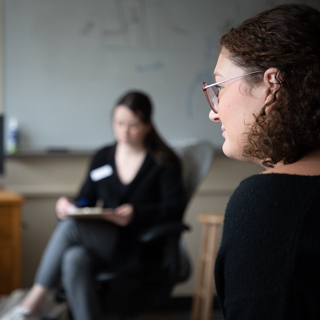Integrated Practice
Why integrated practice?
Within Montana and nationally, social workers seldom have the resources to address their frequently encountered concerns. Rural contexts of practice pose unique challenges in terms of geographic distance, isolation, and lack of access to resources and services. Consequently, social workers are often involved in creating and delivering innovative programs and services. They are required to possess a versatile set of skills, an astute grasp of the social context in which they are delivered, and an ability to relate to audiences whose concerns and priorities reflect their cultural, political, and geographic diversity. The UM MSW program prepares practitioners for these challenges.
Who are becoming integrated social workers?
The MSW program draws students from diverse professional and academic backgrounds, ranging from nursing, education, and creative writing to history, sociology, political science, and social work. This diversity of educational experience in the arts and sciences adds to the richness of the learning environment and the preparation of integrated social work practitioners. Students and faculty bring their diverse practice experiences to bear in the classroom for hands-on integration of theory and practice. Integrated practice comes to life in the work of our students and alums.
Our program
The University of Montana offers a 60-credit graduate study program leading to a Master of Social Work (MSW) degree and admits approximately 25 MSW students annually. We offer a two-year full-time and three-year part-time program; planning guides are available here. Core MSW courses are scheduled on Thursdays and Fridays to limit the time students need to be on campus. The intensive two-day course schedule is designed to promote an integrative learning experience, accommodate students commuting from other parts of the state, and facilitate the arrangement of the practicum experience (supervised professional field education completed concurrently with coursework). Students complete 900 hours of practicum for the generalist and specialization years. The Practicum Coordinator assists students commuting in developing a practicum experience in their home community.
The generalist year provides content and learning experiences related to social work values and ethics, diversity, populations-at-risk, social and economic justice, individual, family, and group counseling, human behavior, and the social environment, social welfare policy and services, generalist social work practice, research, and field education. The specialization year emphasizes applying advanced integrated practice and deepens students’ knowledge and skills in direct practice, social policy analysis, program evaluation, and organizational leadership.
The specialization year is structured to respond to the individual professional goals of adult learners. Students work with a faculty advisor to develop a graduation strategy that addresses student plans for a professional portfolio, practicum learning experiences, and elective courses. Students assume responsibility as teachers, peer consultants, and learners in preparation for leadership roles.
